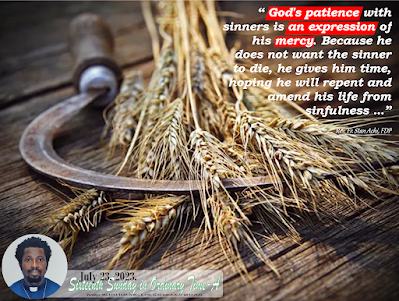THE WHEAT AND THE WEED, GOD'S PATIENCE.
July 23, 2023.
Sixteenth Sunday in Ordinary Time – A.
Readings: Wis 12:13, 16-19; Ps 86:5-6, 9-10, 15-16; Rom8:26-27; Mt 13:24-43.
“You gave your children good ground for hope that you would
permit repentance for their sins.” Ws 12:19
A Turkish proverb says: “Who sows wheat with the devil will
get its chaff.” And an Albanian proverb adds: “A good garden always has weeds.”
God's patience with sinners is an expression of his mercy.
Because he does not want the sinner to die, he gives him time, hoping he will
repent and amend his life from sinfulness. God hates sin in all its forms and
facets, but he does not hate the sinner. He patiently gives him time to convert
and change his way.
God's hatred of sin implies that He loves His people and wants
to bless them. Another reason God hates sin is that sin blinds us to the truth.
And sin by nature opposes the very nature of God who is fount of all holiness
and goodness. Sin is a wound and bruise (Isaiah 1:6), a burden (Psalm 38:4),
something that defiles (Titus 1:15), a heavy debt (Matthew 6:12-15), a stain
(Isaiah 1:18), and a mark of darkness (1 John 1:6). Sinners, instead, are God's
creatures who felt in the seductive power of the devil. God created them good,
but they strayed from righteousness through choices and temptations. God, the
Father of all goodness, wants all to be saved. His mercy goes beyond human
failure and sin. So, He gives the sinner time to convert.
The liturgy today put a special emphasis on God's mercy and
patience with sinners that we are. Evil and good are facts that are real, and
no one can deny their existence. We live in a world created good by God, but
where the devil came to spread the seed of zizania and chaos. God, however,
does not destroy the world per the cause of Zizania. He waits patiently for
man's conversion. For this world is the factory, the laboratory of the Kingdom
of Heaven.
It is beautiful to see and hear how Jesus opens today's
Gospel: “The kingdom of heaven may be likened to a man who sowed good seed in
his field." Or, “The kingdom of heaven is like a mustard seed..." Or
“The kingdom of heaven is like yeast..." Three quite different parables that
speak of a unique reality, the Kingdom of God. Through the Weed and the Wheat,
the Mustard seed, and the Yeast in the flour, the accent is on God's mercy,
patience, and simplicity.
In the first of these three parables, the kingdom of God is
built on patience and mercy. Patience, for the master of the field, though he
sowed only good seed, let the weed grow together with the wheat. The Lord says,
by fear that, while willing to uproot the weed, the wheat may also be affected
or uprooted. God does not confound good and evil. He does not judge and
sentence the good doer together with the evildoer. His patience helps each to
reach clear judgment and maturity. In the end, a clear distinction is made
between weed and wheat. The wheat is kept, while the weed is tight and burned.
While we are still alive, and in this world, God gives us time for repentance
and conversion. Let's not see it as a weakness of God. His patience is not a
sign of weakness but an expression of his mercy. And God's mercy runs til we
are still alive. One day will come, his justice will be applied, that is the
time of the final great harvest. There, he will say: “First collect the weeds
and tie them in bundles for burning; but gather the wheat into my barn.”
In the second parable, the accent is on simplicity and
littleness. The kingdom of God grows amidst us in simplicity and littleness. We
are invited to open ourselves to that simplicity of God. We do not grow through
pride and grander. People filled with themselves and arrogant are not preparing
for the Kingdom of God but for the kingdom of hell. True grandeur springs from
humility, just like the tiny mustard seed is aimed to become a great tree.
And lastly, the yeast in the flour, the third parable. The
Kingdom of God is a place of transformation, and the seed of this
transformation is already engraved in us. We must let ourselves be changed from
within, just like the yeast hidden in the flour leavens it. As Christians, we
are to be like the yeast amid the flour of this world and our societies. Our
mission is to work patiently at the transformation and transfiguration of this
world. Evil can change if we approach it and fight it with goodness.
Patience, simplicity, and mercy, we also see these virtues
in action in the first reading. We are told by the author of the Book of Wisdom
that in his loving care, God shows mercy to sinners. He gives time to sinners
to repent. Though sin is opposed to God's nature, sinners are creatures who
need his love and fatherly care to walk and work toward their transformation.
We are given here, a good ground for hope, that as long as we are still alive
and try our best to change and do away from evil, God's mercy will be at hand.
Because the Lord is good and forgiving.
Left to ourselves, we are weak and we do not know how to work at our conversion nor how to invoke God's mercy. So, Paul says, the Spirit intercedes for us in inexpressible groanings. God's patience is what leads us to his mercy and our transformation.





Comments
Post a Comment